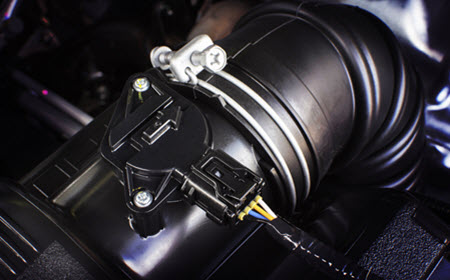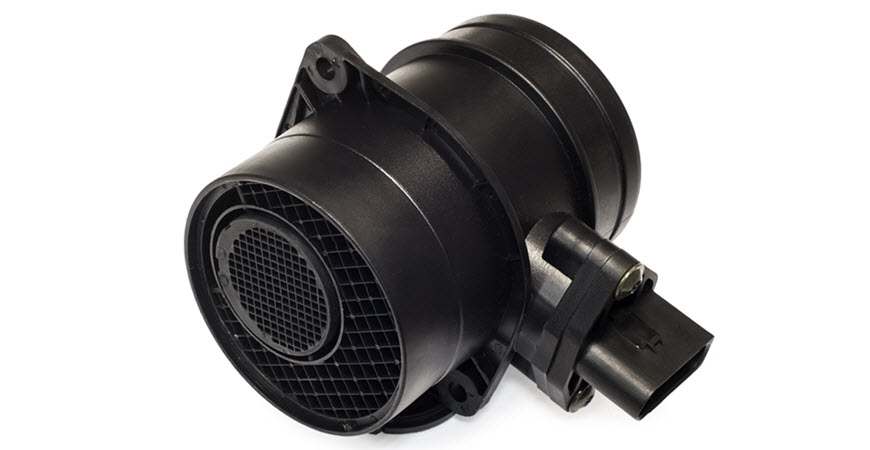Your Mercedes is a masterpiece of engineering and performance that you love to drive. So we understand why it can be nerve wracking when you see the check engine light come on.
You will run through the gamut of possible problems and think about how much it would cost to fix. Often, it can be a sign of a mass airflow sensor malfunction. Knowing what this component does and how to address it is important to keeping your Mercedes running in top condition.
In this article we’ll cover the causes and symptoms of a mass airflow sensor fault, so you can know how to take better care of your Mercedes to ensure it delivers the best driving experience for years.
The Function of a Mass Airflow Sensor
The mass airflow sensor tests the amount and temperature of the air flowing into the engine. The sensor delivers important data to the fuel injection system so it can determine the mix of fuel and air for the engine to fire properly. This keeps your Mercedes operating smoothly across a wide range of altitudes and climates.
Maintaining the proper fuel-to-air mix is important to the wellbeing of your engine, and the mass airflow sensor plays a vital role in its overall performance.
Causes of a Mass Airflow Fault
The mass airflow sensor will wear down over time, due to its collecting pollutants like dirt and road debris. Eventually, it will lose its ability to measure the airflow. When this happens, the engine performance will suffer because it’s no longer getting a proper fuel-to-air mix. While it is possible to clean the sensor, it is usually necessary to replace it when this happens.
Warning Signs of a Mass Airflow Failure
As described above, the sensor will eventually need to be replaced. There are several warning signs you can look for to indicate when it’s time to get your Mercedes in to be serviced.
Check Engine Light
One of the earliest signs you should have when your mass airflow sensor requires replacement will be the check engine light. When your car is diagnosed at a service center, the diagnostic code will alert the technician as to the likelihood of a mass airflow sensor fault.
Loss of Power when Accelerating, Vibration, and Rough Idling
It’s a good idea to pay attention to any behavior of your vehicle that doesn’t match up with your usual experience when driving. Signs that your engine is not getting the proper fuel and air mix because of a sensor fault will show up as vibration when driving and a tendency to idle roughly. The car may seem to have a weaker acceleration than normal.
Fuel Economy
You could notice that your Mercedes is not getting as far as it usually does on a tank of gas. The fuel efficiency of your car will drop dramatically because of the sensor no longer delivering the information the onboard computer needs to correctly calculate the fuel-to-air ratio.
Stalling or Failure to Start Engine
Eventually, your Mercedes will stall after starting the engine. If the problem has gotten bad enough, the engine may not even start. Your Mercedes engine is designed to start only when it’s getting a proper mix of air and gas, and when this falls outside of certain boundaries, it will stop responding to protect itself from damage.
Bavarium Autoworks Can Help
At Bavarium Autoworks, we have been serving customers with pride in the Cupertino, Palo Alto, San Jose, Santa Clara, Saratoga, Mountain View CA area  for years. Our ASE-certified expert technicians will quickly diagnose and resolve a mass airflow problem with your Mercedes using the most up-to-date tools and equipment. We promise we will handle it with the greatest of care to get you back on the road quickly and efficiently.
for years. Our ASE-certified expert technicians will quickly diagnose and resolve a mass airflow problem with your Mercedes using the most up-to-date tools and equipment. We promise we will handle it with the greatest of care to get you back on the road quickly and efficiently.
Our specialty in European-brand cars makes us uniquely suited to handle your Mercedes properly. If you have observed the problems described above, call us today. You can also drop in and experience our superior service firsthand and find out why our customers trust us so much. We look forward to earning your repeat business in the future for all your Mercedes Benz service and repair needs.

